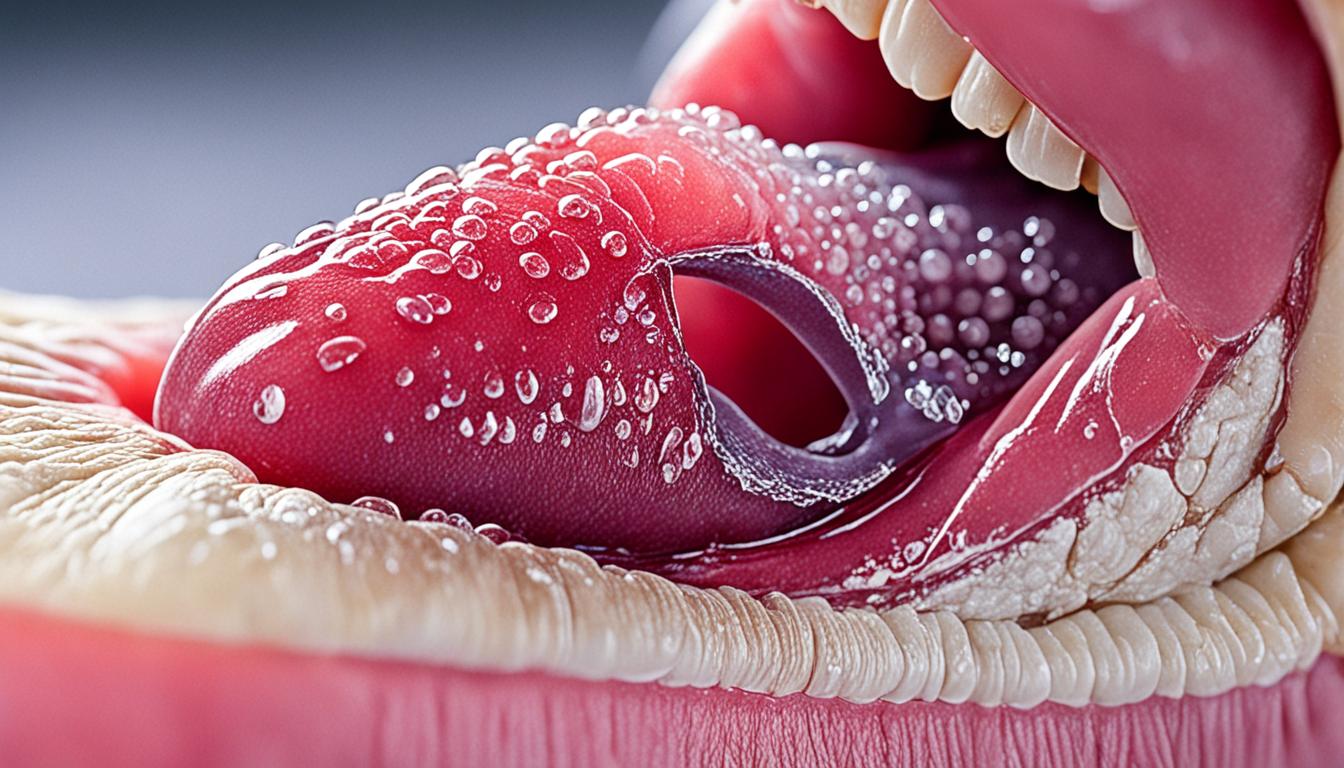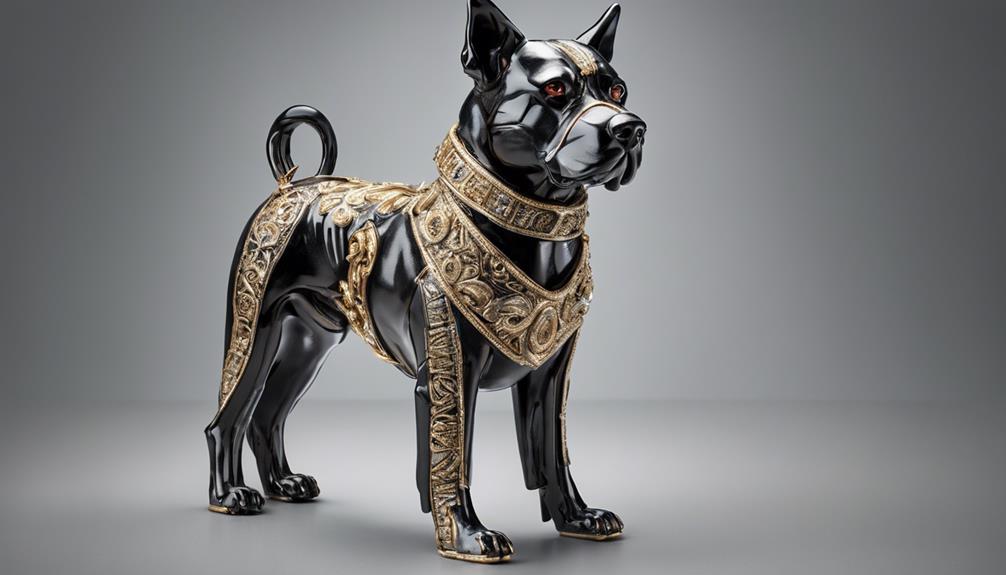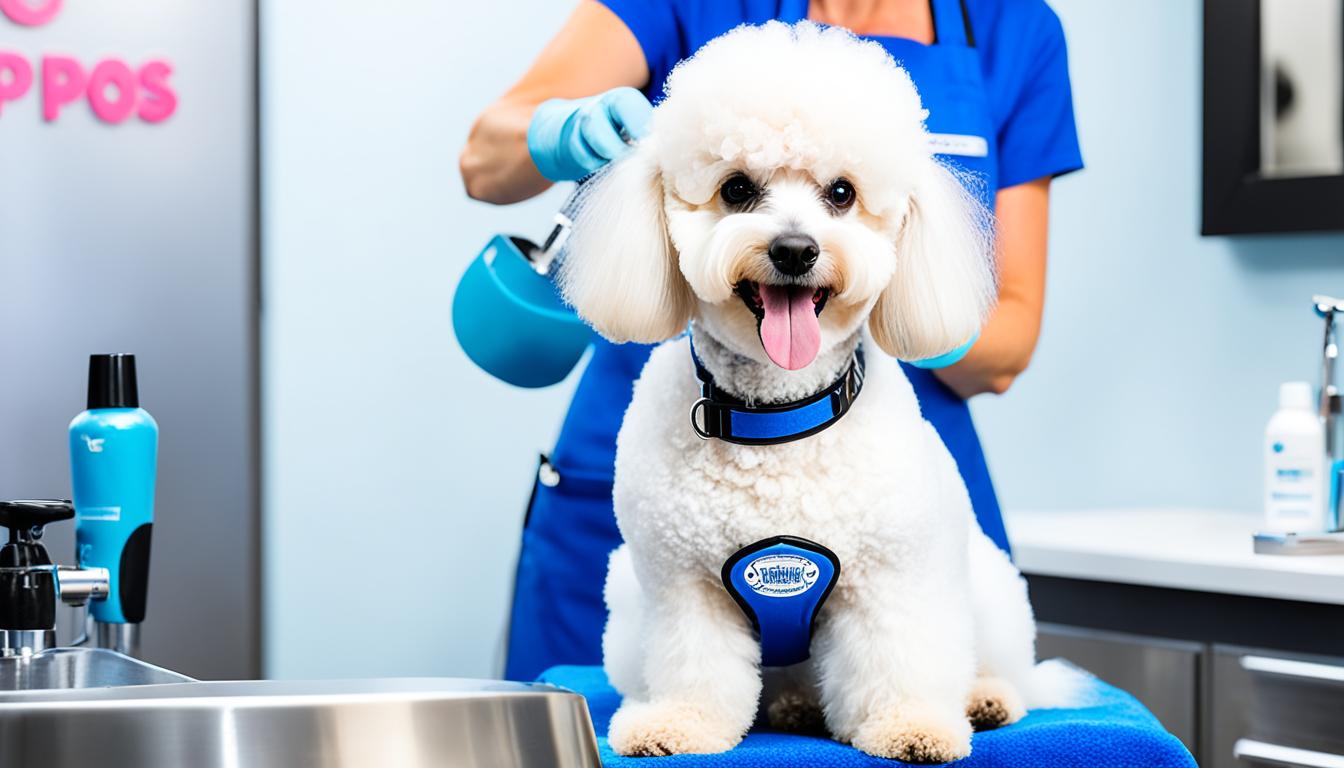Did you know that dogs possess approximately 220 million scent receptors in their noses, in stark contrast to the paltry 5 million that we humans have? The remarkable sensory abilities of dogs enable them to navigate their environment and interact in manners that are beyond our comprehension. One interesting behavior that numerous dog owners have observed is their furry companion’s habit of licking their toes. So, why do dogs lick feet, and what does it signify about their innate canine instincts?
General Reasons Dogs Use Their Tongues
Dogs utilize their tongues for a variety of purposes, driven by their sensory behavior and communication instincts. These reasons shed light on the canine behavior of licking and help explain why dogs may choose to lick human feet.
1. Gathering Information:
The primary function of a dog’s tongue is to gather information about their environment. By licking surfaces and objects, dogs can taste and smell different scents, providing them with valuable sensory input.
2. Smell and Taste:
Dogs have an exceptional sense of smell, and their tongues play a crucial role in sampling odors. By licking and tasting the air, they can analyze scents and identify various substances around them.
3. Communication and Social Interaction:
Licking is a significant form of communication in the canine world. When dogs lick each other, it conveys messages of affection, submission, and appeasement. This behavior helps them establish and maintain social bonds.
Licking can also be a way for dogs to interact and communicate with their human companions. It can be a sign of affection, a request for attention, or even a form of seeking reassurance.
Understanding these general reasons behind dog licking behavior provides insight into why dogs may extend this behavior to human feet. Further exploration will help us decipher the specific motivations behind this unique canine behavior.
Dogs Lick Human Feet: Unpacking the Reasons
Dogs engage in licking behavior for a variety of reasons, and human feet are no exception. Understanding why dogs lick feet can shed light on their affectionate nature and communication methods. There are several reasons behind this behavior, each serving a unique purpose in the canine world.
- Showing Affection and Submission: Licking is a display of love and devotion for many dogs. By licking your feet, your furry companion may be expressing their deep affection and loyalty towards you.
- Attracted to the Taste of Sweat: Dogs have a heightened sense of taste, and the salt and sweat on human feet can be irresistible to them. The unique flavors may entice them to lick and explore further.
- Grooming Behavior: Licking is an instinctual grooming behavior in dogs. Just as they groom their own paws and fur, they may perceive your feet as needing some cleaning or attention.
- Seeking Attention: Dogs thrive on social interaction and attention from their owners. Licking your feet may be their way of seeking your attention and engaging in bonding activities.
- Relieving Anxiety and Stress: Licking can be a self-soothing mechanism for dogs when they feel anxious or stressed. Your feet may provide them with a sense of comfort and security.
Licking feet not only satisfies a dog’s natural tendency to explore the world through their senses, but it also serves as a form of communication between canines and humans. It’s important to interpret this behavior in the broader context of your dog’s overall body language and demeanor to understand their intentions and emotions.
“Dogs have a unique way of expressing their affection and communicating with their human companions. Licking feet is just one of the many ways they show their love and seek attention.”
By observing your dog’s body language and considering their individual personality traits, you can better decipher the reasons behind their foot-licking behavior. Remember, every dog is unique, and their motivations may vary. It’s essential to maintain a loving and caring relationship with your furry friend while also respecting personal boundaries and hygiene concerns.
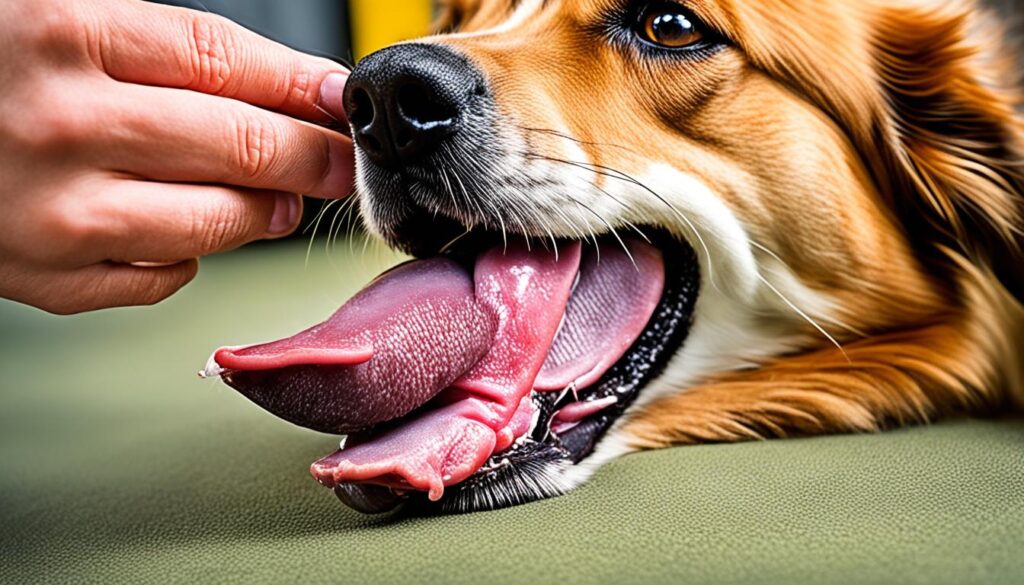
| Reasons Dogs Lick Human Feet | Description |
|---|---|
| Affection and Submission | Expressing love and loyalty |
| Taste of Sweat | Attracted to the unique flavors |
| Grooming Behavior | Instinctual cleaning and attention |
| Seeking Attention | Desire for social interaction |
| Relieving Anxiety and Stress | Self-soothing mechanism |
Identifying Excessive Licking Behavior
Excessive licking, particularly when focused on a specific area like feet, can indicate an underlying health issue or behavioral problem. It’s important for pet owners to be vigilant in identifying signs of excessive licking and seek professional advice from a veterinarian.
Signs of excessive licking behavior in dogs may include:
- Obsessive behavior:
- Excessive and persistent licking that seems to have no purpose or end.
- Changes in behavior or increased anxiety:
- Unusual behavior, restlessness, or signs of anxiety in conjunction with excessive licking.
- Development of skin irritation or infections:
- Redness, swelling, rawness, or open sores on the skin due to constant licking, which can potentially lead to infections.
Seeking Professional Advice
If you notice any of these signs, it’s crucial to consult with a veterinarian to determine the underlying cause of the excessive licking. The veterinarian will be able to assess your dog’s overall health and behavior and provide appropriate guidance and treatment options.
“Identifying signs of excessive licking early on can help prevent further complications and improve your dog’s wellbeing.”
Excessive licking can be indicative of underlying health issues, such as allergies, skin infections, or gastrointestinal problems. Additionally, behavioral issues such as anxiety, boredom, or compulsive disorders can also manifest through excessive licking behaviors.
A thorough evaluation by a professional will help differentiate between medical and behavioral causes, guiding you towards an effective solution. It’s important not to dismiss excessive licking as a minor issue, as it can lead to discomfort, skin problems, and other complications if left unaddressed.
To better understand the reasons behind your dog’s excessive licking and develop an appropriate approach, consulting a veterinarian is the best course of action.
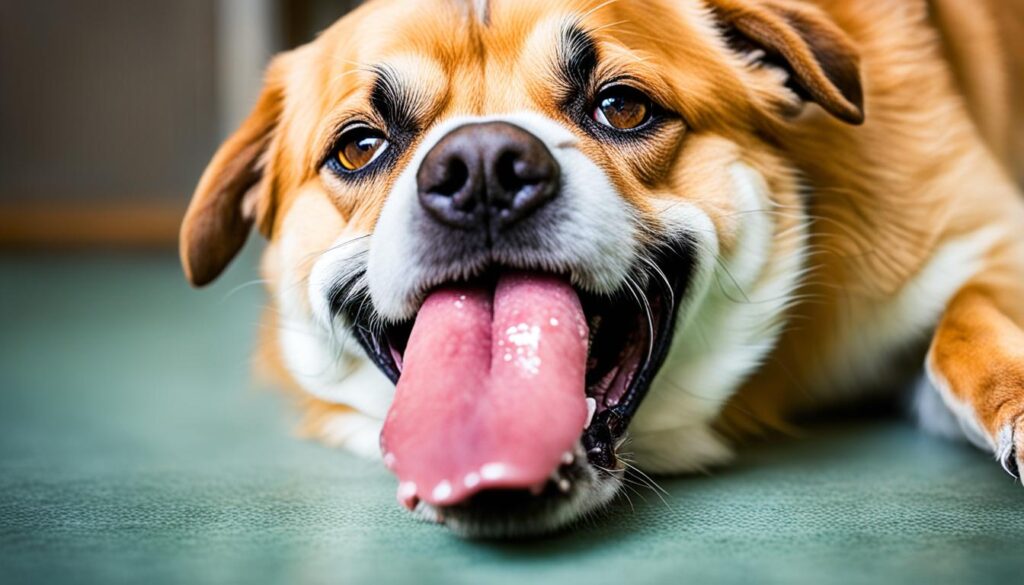
Is It Good for a Dog to Lick Your Feet?
Dog licking feet is generally considered a normal behavior, but it’s important to consider personal preferences and potential health concerns. Licking sweaty feet can increase the risk of infection if there are open wounds on the feet or if the dog has underlying medical conditions or dental issues. However, if both the owner and the dog are comfortable with the behavior, it can strengthen the bond between them.
Dogs have a natural instinct to lick, which can be attributed to their grooming behavior and their way of showing affection. However, it’s crucial to be mindful of the potential effects of dog licking on human health and the hygiene of dog licking feet.
In terms of human health, dog licking can introduce bacteria and pathogens into any open wounds or cuts on the feet, increasing the risk of infection. This is particularly important for individuals with compromised immune systems or conditions that may make them more susceptible to infections. It’s advisable to keep the feet clean and disinfected to minimize any potential risks associated with dog licking.

Moreover, some dogs may have dental issues or medical conditions that can contribute to poor oral health, which can be transferred through licking. Regular veterinary check-ups and maintaining good dental hygiene for your dog can help mitigate any potential health risks associated with dog licking.
On the other hand, if the owner and the dog are both comfortable with the behavior, allowing the dog to lick your feet in a controlled and clean environment can enhance the bond and trust between them. It can be seen as a form of affection and communication from the dog’s perspective. However, it’s important to ensure the feet are clean and free from any open wounds or infections to reduce any potential harm.
Overall, the acceptance of dog licking feet is subjective and can vary depending on personal preferences and potential health concerns. It’s essential to prioritize hygiene and take necessary precautions if there are any underlying health conditions or risks involved.
What to Do If Your Dog Licks Your Feet Too Much
If your dog’s licking of feet becomes excessive or obsessive, it’s important to address the behavior to prevent any potential issues. Here are some steps you can take to manage and redirect their behavior:
- Redirect their attention: Encourage your dog to engage in alternative activities that divert their attention away from licking your feet. Provide interactive toys or puzzles that can keep them mentally stimulated and occupied.
- Positive reinforcement: Use positive reinforcement techniques to reward your dog for behaviors that do not involve licking your feet. When they choose to engage in appropriate behaviors, such as sitting calmly or playing with their toys, praise and reward them with treats or verbal cues.
- Avoid punishment: Punishment-based methods can be ineffective and may worsen the behavior. Instead, focus on redirecting and reinforcing positive behaviors to encourage your dog to adopt new habits.
- Seek professional advice: If your dog’s licking persists or causes concern, it’s advisable to consult a veterinarian or a professional dog behaviorist. They can assess the behavior and provide expert guidance to address the issue effectively.
By redirecting your dog’s attention, reinforcing alternative behaviors, and seeking professional advice when necessary, you can help stop your dog from licking your feet excessively. Remember to be patient and consistent in your approach as behavior modification takes time and consistency.

What to Do If Your Dog Won’t Stop Licking Their Paws
Dogs may exhibit excessive paw licking behavior due to various reasons, such as allergies, anxiety, or boredom. Identifying the underlying cause is essential in addressing this behavior and ensuring your dog’s well-being. If you notice signs of irritation, inflammation, or open wounds on their paws, it is advised to consult a veterinarian to determine if there are any underlying medical conditions or allergies that need to be addressed.
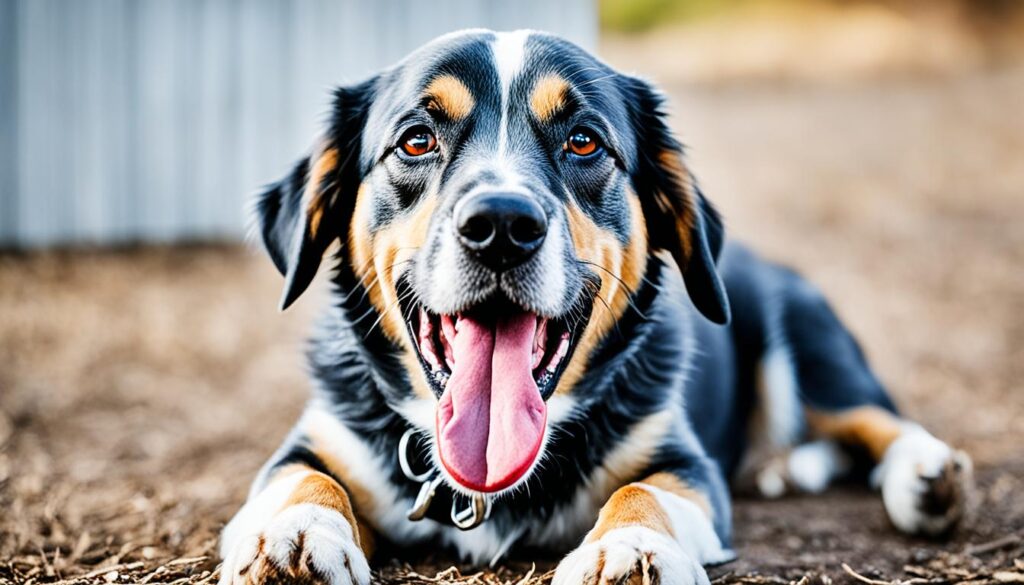
If your dog’s paw licking behavior persists despite addressing any potential medical issues, it may be necessary to take additional steps to manage and redirect their excessive licking behavior. This can be achieved through various techniques:
- Provide mental stimulation and physical exercise to alleviate boredom and anxiety.
- Introduce interactive toys and puzzles that can keep your dog occupied and engaged.
- Consider using bitter-tasting sprays or applying paw balm to discourage licking.
- Redirect your dog’s attention with positive reinforcement training, rewarding them for engaging in alternative behaviors.
It is important to note that punishment-based methods should be avoided, as they can lead to increased stress and anxiety in your dog.
If you continue to experience difficulty in managing your dog’s excessive paw licking behavior, seeking professional advice from a veterinarian or a certified dog behaviorist can provide further guidance and assistance tailored to your dog’s specific needs.
The Reasons Behind Dogs Licking Feet
Dogs have a multitude of reasons for licking feet, ranging from sensory attraction to communication and attention-seeking behavior. Understanding these reasons can shed light on this curious canine behavior.
Flavor and Scent Attraction
One of the primary reasons dogs lick feet is their attraction to the flavor of sweat. Dogs have a highly developed sense of taste, and the saltiness of sweat can be appealing to them. Additionally, the feet contain scent glands that produce pheromones, which can also entice dogs to lick.
Communication and Attention-Seeking Behavior
Licking feet can serve as a means of communication and a way for dogs to seek attention. Just as dogs lick their pack members as a sign of affection, they may interpret human feet as a target for expressing their love and seeking interaction with their owners. This behavior can be particularly pronounced when dogs are feeling happy or excited.
Feet licking can also be a self-soothing behavior for dogs, especially when they’re feeling stressed or anxious.
By licking feet, dogs may find comfort and relief from negative emotions. It can be a self-soothing behavior that helps them cope with stress or anxiety, similar to how some people find comfort in habits like nail-biting or hair twirling.
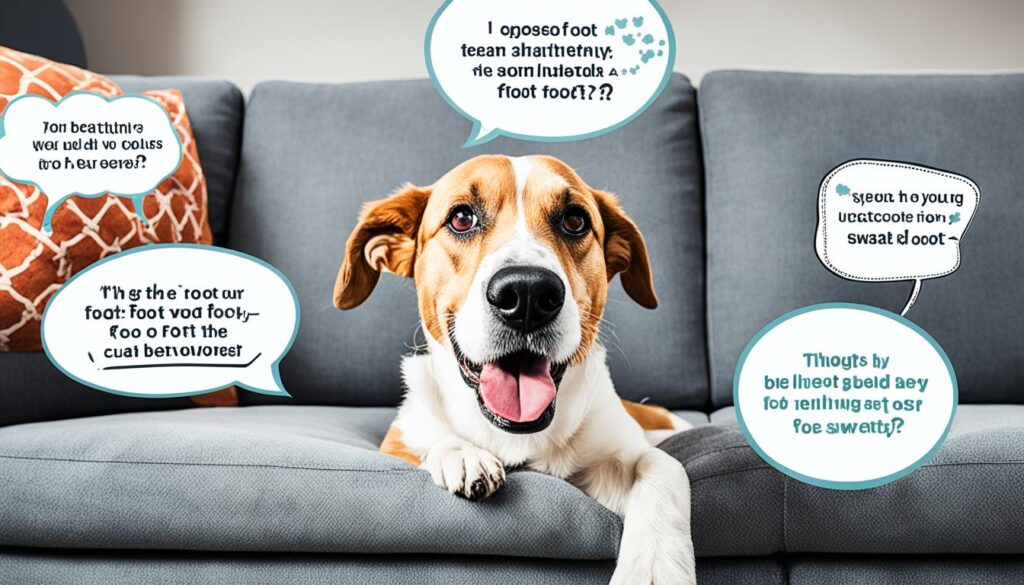
As with all dog behaviors, it’s important to consider the context and individual preferences. If both the dog and owner are comfortable with feet licking and there are no hygiene or health concerns, it can be an innocent and affectionate gesture that strengthens the bond between them.
| Reasons Dogs Lick Feet | Explanation |
|---|---|
| Flavor and Scent Attraction | Feet sweat contains a salty taste that dogs find appealing, and the scent of pheromones can pique their interest. |
| Communication and Attention-Seeking | Dogs may lick feet to express affection, seek interaction, or simply get their owner’s attention. |
| Self-Soothing Behavior | Licking feet can help dogs alleviate stress and anxiety, providing them with a calming effect. |
Is It Good for a Dog to Lick Feet?
When it comes to a dog licking feet, whether it’s considered a good thing or not depends on personal preference and concerns about hygiene. While some people find it endearing or see it as a sign of affection, others may find it unappealing or even unsanitary. It’s important to consider individual comfort levels and prioritize hygiene if there are concerns.
Feet licking can be managed by implementing certain strategies to limit access or redirect the dog’s attention to other activities:
- Covering the feet: By wearing socks or using footwear around the house, you can physically prevent your dog from licking your feet. This option allows you to maintain personal cleanliness and avoid any potential discomfort.
- Redirecting attention: Engaging your dog in alternative activities, such as playing with toys or practicing obedience commands, can divert their focus away from licking feet. Providing mental and physical stimulation is essential in curbing the behavior.
Ultimately, whether or not it’s good for a dog to lick feet is a matter of personal preference and hygiene concerns. By managing access to feet and actively redirecting the dog’s behavior, you can find a balance that works for both you and your furry companion.
How to Prevent Dog from Licking Feet
To prevent a dog from licking feet, positive reinforcement training techniques can be highly effective. By redirecting their attention to other behaviors and providing alternative outlets for their licking behavior, you can discourage the habit in a gentle and humane way.
Positive Reinforcement Training
Positive reinforcement training is a proven method for modifying behavior in dogs. By rewarding desired behaviors with treats, praise, or play, you can encourage your dog to engage in activities other than licking feet.
Here’s how you can use positive reinforcement to prevent your dog from licking feet:
- Create a Distraction: When you notice your dog starting to lick your feet, redirect their attention by offering a distraction such as a favorite toy or interactive feeder.
- Reward Alternative Behaviors: Whenever your dog chooses not to lick your feet and engages in a different behavior, such as sitting or lying down, immediately praise and reward them with a treat.
- Consistency is Key: Be consistent in your training efforts. With time and repetition, your dog will learn that avoiding feet licking leads to positive rewards.
Providing Alternative Outlets
Dogs often lick as a way to relieve stress or boredom. By providing alternative outlets for their energy and anxiety, you can reduce the likelihood of them resorting to licking feet. Here are some ideas:
- Chew Toys: Offer a variety of safe and suitable chew toys for your dog to redirect their licking behavior. This will keep them occupied and satisfied.
- Puzzle Toys: Interactive feeders or puzzle toys that dispense treats can provide mental stimulation and keep your dog engaged, ultimately diverting their focus away from feet licking.
- Exercise and Play: Regular exercise and play sessions are essential for a dog’s overall well-being. Engage in fun activities such as fetch, tug-of-war, or agility training to keep your dog physically and mentally stimulated.
Remember, each dog is unique, and it may take some trial and error to find the most effective methods for preventing your dog from licking feet. If you’re struggling or would like extra guidance, consider consulting a veterinarian or professional dog trainer who can offer tailored advice based on your dog’s specific needs and behavior.

| Benefits of Positive Reinforcement Training | Alternative Outlets for Licking Behavior |
|---|---|
|
|
Conclusion
In conclusion, understanding canine behavior, specifically why dogs lick feet, is crucial for pet owners. Dogs licking feet is a natural behavior driven by their sensory instincts and serves as a way for them to communicate and gather information about their environment. While occasional foot-licking is generally harmless, excessive or obsessive licking may indicate underlying issues.
By recognizing the reasons behind dogs licking feet, such as showing affection, seeking attention, or relieving anxiety, pet owners can better interpret and respond to their canine companions. It is important to monitor the behavior for signs of excessive licking, as it may be a symptom of a health problem or behavioral issue.
Seeking professional advice from a veterinarian or a dog behaviorist can provide valuable insights and guidance in managing and addressing excessive licking behavior. Ultimately, understanding the motivations behind dogs licking feet can foster a healthier relationship between pet owners and their furry friends, enhancing their overall well-being and happiness.
